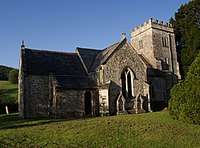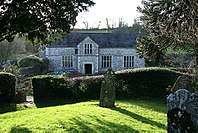Widworthy
Widworthy is a village, parish and former manor in Devon, England. The village is 3 1/2 miles east of Honiton and the parish is surrounded clockwise from the north by the parishes of Stockland (a short boundary only), Dalwood, Shute, Colyton, Northleigh, and Offwell.[1] The parish church is dedicated to St Cuthbert. Near the church is Widworthy Barton, the former manor house, which is largely unaltered from its early 17th century form.[2] Widworthy Court is a mansion within the parish built in 1830 by Sir Edward Marwood Elton to the design of G.S. Repton.[3]


History
The Domesday Book of 1086 lists Widworthy among the 27 Devonshire holdings of Theobald FitzBerner, one of the tenants-in-chief in Devon of King William the Conqueror. His tenant was a certain Oliver. His lands later formed part of the feudal barony of Great Torrington.[4] At some time in the 13th century, John de Humfraville held the feudal barony,[5] and had his own tenant at Widworthy. The earliest lord of the manor recorded by the Devon historian Sir William Pole (died 1635) was Sir William de Widworthy.[6]
The manor was later inherited by the Wotton family.[6] The last in the male line was John Wotton who left a daughter and heiress Alice Wotton, who married Sir John Chichester (1385-1437),[7] lord of the manor of Raleigh. The manor was still in the Chichester family in the early 17th century, being then held by Hugh, according to Pole.[6]
References
- "Facts and Figures". (link to Devon Parishes map). Devon County Council. Retrieved 23 May 2020.
- Pevsner, Nikolaus & Cherry, Bridget, The Buildings of England: Devon, London, 2004, p.910
- Pevsner, p.911
- Thorn, Caroline & Frank, (eds.) Domesday Book, (Morris, John, gen.ed.) Vol. 9, Devon, Parts 1 & 2, Phillimore Press, Chichester, 1985, part 2 (notes), Chapter 36
- Thorn, Part 2 (notes), 36:26
- Pole, Sir William (d.1635), Collections Towards a Description of the County of Devon, Sir John-William de la Pole (ed.), London, 1791, pp.144–5
- Vivian, Lt.Col. J.L., (Ed.) The Visitations of the County of Devon: Comprising the Heralds' Visitations of 1531, 1564 & 1620, Exeter, 1895, p.172